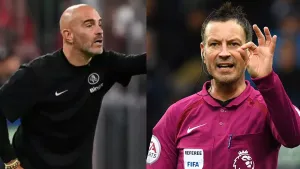In a heated Champions League encounter at the Allianz Arena, Chelsea suffered a 3-1 defeat to Bayern Munich, but the post-match discussion centred around a controversial incident involving Bayern defender Jonathan Tah and Chelsea forward João Pedro.
Chelsea manager Enzo Maresca didn't hold back, insisting that Tah's actions warranted a straight red card, sparking debates among fans, pundits, and referees alike about VAR decisions and foul interpretations in modern football.
The match, part of the 2025/26 UEFA Champions League group stage, saw Bayern Munich dominate with goals from an own goal by Trevoh Chalobah, a Harry Kane penalty, and Kane's second strike in the 63rd minute. Chelsea's sole response came from Cole Palmer, but the Blues' frustrations boiled over due to perceived refereeing inconsistencies, particularly Tah's off-the-ball tangle with Pedro.
Cole Palmer might just go down as one of Chelsea’s greatest ever signings ⭐ pic.twitter.com/kS2suCLQEW
— Football on TNT Sports (@footballontnt) September 18, 2025
The Controversial Incident: What Happened Between Jonathan Tah and João Pedro?
Midway through the game, with tensions running high, Jonathan Tah appeared to swing his arm toward João Pedro's throat during an off-the-ball moment, leaving the Brazilian forward sprawled on the pitch. Referee Jose Maria Sanchez deemed the challenge worthy of only a yellow card, a decision that immediately drew protests from the Chelsea bench. Maresca himself was booked for his vehement disagreement, highlighting the intensity of the moment.
Video replays showed Tah making contact without any apparent attempt to play the ball, fuelling arguments that the foul crossed into violent conduct territory. This incident has reignited discussions on what constitutes a red card offense under IFAB rules, especially when intent seems evident but force is debated.
So Jonathan Tah can now punch a player in the throat and not get sent off, good to know. pic.twitter.com/1rzfQAEN4n
— CFC Russ (@CFC_Russ) September 17, 2025
Enzo Maresca's Post-Match Outburst: 'It Should Have Been a Red Card'
Speaking in his post-match press conference, Enzo Maresca expressed clear frustration with the referee's call, emphasizing the lack of intent to play the ball as a key factor.
“It should have been a red card,” Maresca said. “I always said it was a red card when there is no intention to go for the ball just when the intention is to kick another player. Why is it not a red card? The referee said it was not hard or aggressive enough. So to give you a red card, they need to see your blood or they need to see something. If the intention is to go there, it’s a red card. So for me there is not any doubt.”
Maresca's comments echo a growing sentiment among managers that referees and VAR officials are too lenient on potentially dangerous plays unless visible injury occurs. His reference to needing "blood" to justify a sending-off has gone viral on social media, with fans debating whether the Premier League and Champions League standards align on such matters.
🚨🗣️ Enzo Maresca: "The decision from the referee to not send off Jonathan Tah had been quite tough... For me personally it's more a red card when there's no inention to go for the ball!" pic.twitter.com/PN7dxvjmXW
— The Touchline | 𝐓 (@TouchlineX) September 17, 2025
Expert Analysis: Why Wasn't Jonathan Tah Sent Off?
Not everyone agrees with Maresca's assessment. Former Premier League and FIFA referee Mark Clattenburg provided a detailed breakdown, explaining that while the challenge was reckless, it didn't meet the thresholds for a red card under current laws.
Clattenburg noted: "There was no malice, excessive force, or violence in the challenge, meaning the only possible red card offence would have been denial of a goalscoring opportunity. Given the distance from goal and the possibility of a covering defender, it’s unlikely the incident met that threshold. Therefore, the referee’s decision to show a yellow card was correct."
He further clarified that "intention" has been removed from the Laws of the Game, with referees now focusing on factors like force, malice, and speed. This perspective suggests Maresca's frustration might stem more from the match result than the decision itself, though it doesn't diminish the debate over consistency in officiating.
Final Thoughts: A Turning Point or Just Another Debate?
Enzo Maresca's strong stance on Jonathan Tah's foul underscores the fine line between aggressive defending and dangerous conduct in football. While the referee's decision stood, the incident has fuelled passionate discussions across platforms, reminding us why the beautiful game often turns controversial.
As Chelsea prepares for their next challenge, Maresca will hope his team channels this frustration into positive results on the pitch.




